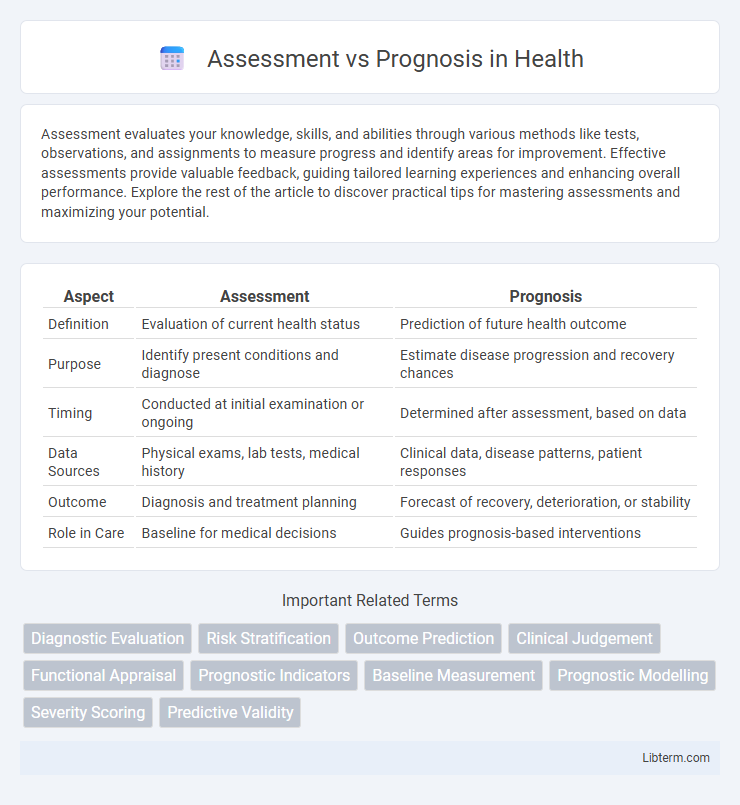Assessment evaluates your knowledge, skills, and abilities through various methods like tests, observations, and assignments to measure progress and identify areas for improvement. Effective assessments provide valuable feedback, guiding tailored learning experiences and enhancing overall performance. Explore the rest of the article to discover practical tips for mastering assessments and maximizing your potential.
Table of Comparison
| Aspect | Assessment | Prognosis |
|---|---|---|
| Definition | Evaluation of current health status | Prediction of future health outcome |
| Purpose | Identify present conditions and diagnose | Estimate disease progression and recovery chances |
| Timing | Conducted at initial examination or ongoing | Determined after assessment, based on data |
| Data Sources | Physical exams, lab tests, medical history | Clinical data, disease patterns, patient responses |
| Outcome | Diagnosis and treatment planning | Forecast of recovery, deterioration, or stability |
| Role in Care | Baseline for medical decisions | Guides prognosis-based interventions |
Understanding Assessment: Definition and Objectives
Assessment involves systematically gathering information to evaluate an individual's current condition, abilities, or performance. Its primary objectives include identifying strengths and weaknesses, diagnosing issues, and informing decision-making processes for interventions or support. Accurate assessment relies on standardized tools, objective criteria, and comprehensive data collection to ensure reliable and valid results.
What is Prognosis? Core Concepts Explained
Prognosis refers to the predicted outcome or course of a disease based on clinical evaluation, patient history, and diagnostic test results. It involves estimating the likelihood of recovery, disease progression, or survival rates using statistical models and evidence-based data. Unlike assessment, which identifies current health status, prognosis provides insight into future health trajectories and treatment effectiveness.
Key Differences Between Assessment and Prognosis
Assessment involves the systematic collection and analysis of data to evaluate a patient's current health status, using diagnostic tests, physical examinations, and history-taking. Prognosis predicts the likely course, outcome, and chances of recovery or progression for a disease based on the assessment findings, patient demographics, and clinical evidence. Key differences include assessment being a present-focused evaluation tool, while prognosis offers future-oriented predictions essential for treatment planning.
Methods and Tools for Effective Assessment
Assessment methods in healthcare utilize structured interviews, standardized questionnaires, and diagnostic tests to gather comprehensive patient data, ensuring accurate identification of current conditions. Tools such as the Clinical Global Impression Scale, Montreal Cognitive Assessment, and symptom checklists enhance objective evaluation by quantifying symptom severity and functional impairment. These methods provide a critical foundation for prognosis by informing risk stratification, potential disease progression, and individualized treatment planning.
Prognostic Models: Approaches and Applications
Prognostic models utilize statistical and machine learning approaches to predict a patient's future clinical outcomes based on historical and real-time data, enhancing personalized medicine. These models integrate variables such as demographic data, clinical indicators, and genetic markers to improve accuracy in forecasting disease progression and treatment response. Applications span oncology, cardiology, and chronic disease management, enabling early intervention and optimized resource allocation.
The Role of Assessment in Clinical Decision-Making
Assessment in clinical decision-making involves the systematic collection and analysis of patient data to identify health status, diagnose conditions, and determine treatment needs. It provides objective evidence critical for formulating accurate diagnoses, guiding immediate interventions, and monitoring progress. This process ensures personalized care plans that improve patient outcomes by integrating clinical findings with patient history and diagnostic tools.
How Prognosis Guides Treatment Planning
Prognosis provides a predictive insight into the likely course and outcome of a disease, enabling healthcare professionals to tailor treatment plans effectively. By evaluating factors such as disease stage, patient health, and response to interventions, prognosis informs decisions on medication, therapy intensity, and duration. This strategic approach optimizes patient outcomes by aligning treatment goals with expected disease progression.
Integrating Assessment and Prognosis in Practice
Integrating assessment and prognosis in clinical practice enhances decision-making by combining comprehensive patient data with predictive analytics to tailor personalized treatment plans. Utilizing validated assessment tools alongside prognostic models improves accuracy in identifying disease progression and potential outcomes. This approach facilitates timely interventions and optimizes patient care through evidence-based strategies.
Common Misconceptions and Challenges
Assessment often involves gathering current data to understand a patient's condition, while prognosis predicts future outcomes based on that data; a common misconception is treating them as interchangeable rather than sequential steps. Challenges in assessment include incomplete or inaccurate information, whereas prognosis faces difficulty due to variability in disease progression and individual response to treatment. Misunderstanding these distinctions can lead to inappropriate clinical decisions and patient expectations.
Future Trends in Assessment and Prognostic Science
Emerging technologies like artificial intelligence and machine learning are revolutionizing both assessment and prognosis by enabling more precise data analysis and personalized predictions. Integration of multi-omics data and real-time monitoring devices is enhancing the predictive accuracy of prognostic models, facilitating early interventions. Future trends emphasize the development of dynamic, adaptive assessment tools that continuously update prognostic outcomes based on evolving patient data and environmental factors.
Assessment Infographic

 libterm.com
libterm.com